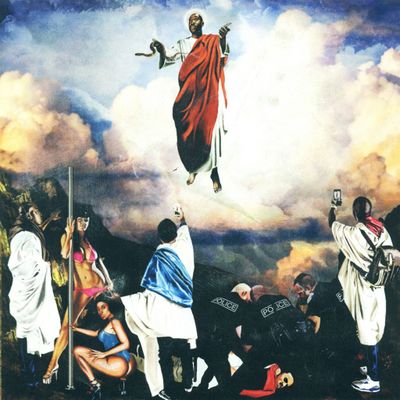
Over the past decade plus, Freddie Gibbs has carved out a reputation for honesty. Born and raised in Gary, Indiana, the artist’s countless mixtapes and recent albums (roughly one a year since his 2013 debut studio album ESGN) offered living proof that the candor associated with classic gangster rap could survive the genre’s commercial decline. He’s not quite a throwback, but he is a stalwart, a true believer in the power of spoken words regarding criminal deeds, framed in complete sentences and delivered with unfiltered charisma. Where younger artists mix and match multiple aesthetics, Gibbs, now 34 years old, distills and refines the one he grew up with in the ’90s. He means what he says, and he sounds like the grown man he is.
When he talks — as he does on You Only Live 2wice, which was released last week — about losing his friends, it’s hard to doubt him. The album resounds with observations of former friends grown absent, gone silent, or turned jealous, and Gibbs doesn’t sound bitter so much as dazed. It’s a natural response. Friends, close ones at least, aren’t just people one spends time with; on closer view, they are who you are. The surest way to find out who you are isn’t introspection or mirror-gazing, but drawing a composite sketch of the five or ten people nearest to you; if that’s the case, then to lose those friends is to lose one’s identity altogether. YOL2 is one of the shorter entries in the Gibbs catalogue, weighing in at eight tracks over 32 minutes, and its temporal leanness is matched by a mentality that’s stripped down even by Gibbs’s standards. Once again he’s been reduced to a bare margin of survival, and his only resource he can rely on is his word.
It would be easy enough to draw a connection between Gibbs’s precarious state and his much-publicized months-long imprisonment in Vienna on charges of sexual assault, but he does that well enough on his own. The trials and strains of prison life figure prominently: We learn, through his rhymes, about the ethnolinguistic composition of the Austrian prison system (“Came out that bitch, was speaking German, Russian, Wop-a-nese”), the fact that there are no English-language books in the prison library, the drug habit he had to kick cold turkey in his cell (“I be kicking shit like Solange in the elevator”), the weight he lost stressing out, the extra lawyers he had to hire, and so on. Gibbs states his innocence early on (“I just beat a rape case, groupie bitch I never fucked / Tried to give me ten for some pussy that I never touched”) but the picture grows more complicated on the album’s final track “Homesick” when he claims that he spent time in prison on account of his companions. He doesn’t say it directly, but you can infer that though he didn’t commit the crime he was accused of, a member of his entourage might have. Being one with your friends doesn’t always work out for the best: “Just sat in the cell, ten thousand miles away from my child, for my niggas.”
The reference to Gibbs’s recently born daughter is one sign among many that he’s turning away from his old friends and thinking more of the women, past and present, who have supported him. “Dear Maria” and “Andrea” are notes of gratitude addressed to exes who fed him and provided for him: “Gave me that pussy once and I always got it like the Wi-Fi.” But it’s his wife and daughter’s mother, Erica, who receives the most thanks: It’s Erica, after all, who flies to Vienna to see him (“Erica visit, can’t wipe her tears from behind the glass”), and who brings him English-language books. “She held me down, know what I mean?” Gibbs asks rhetorically on the outro to “Homesick.” “Through all the bullshit, through all my bullshit, she held me down. I love her for that.” If he’s looking to the future, he’s doing so taking into account the fact that the competition between hustling and family is a zero-sum game. “Got a list of things I don’t want my daughter to do,” Gibbs raps; still, it’s hard to maintain balance when his art depends on reciting the items on that list. Pulling off the transition from street rap to dad rap is rough, but he’s making the effort.
The theme of homecoming on the album manifests as much in the beats as in the lyrics. The flirtations with singing and Southern mantra-style hooks present on Gibbs’s last (quite good) album Shadow of a Doubt (2015) have largely vanished. He’s back to the two sounds he’s most familiar with: the old-school, soul-inflected instrumentals that dominated on his breakthrough Madlib collaboration Piñata (2014) and the variation on Southern trap production evolved by his house producer Speakerbomb featuring high distorted vocal samples and/or synth keys over 808s. (“Alexys,” a YOL2 highlight produced by Kaytranada and BadBadNotGood, falls squarely in this latter category.)
The album is short, but it feels rich and lived-in. It’s not always a good sign when rappers declare they’re not going anywhere, but with Gibbs it’s clear that he can thrive by building on what he knows best, and by staying with the people who stuck with him, at home in America. The States aren’t paradise, as he well knows. The sense of freedom isn’t much less endangered than in Austria: “Donald Trump gon’ chain us up and turn us back to slaves,” he mutters on “Crushed Glass.” But his family’s here and he’s fluent in the language, and that makes all the difference.

